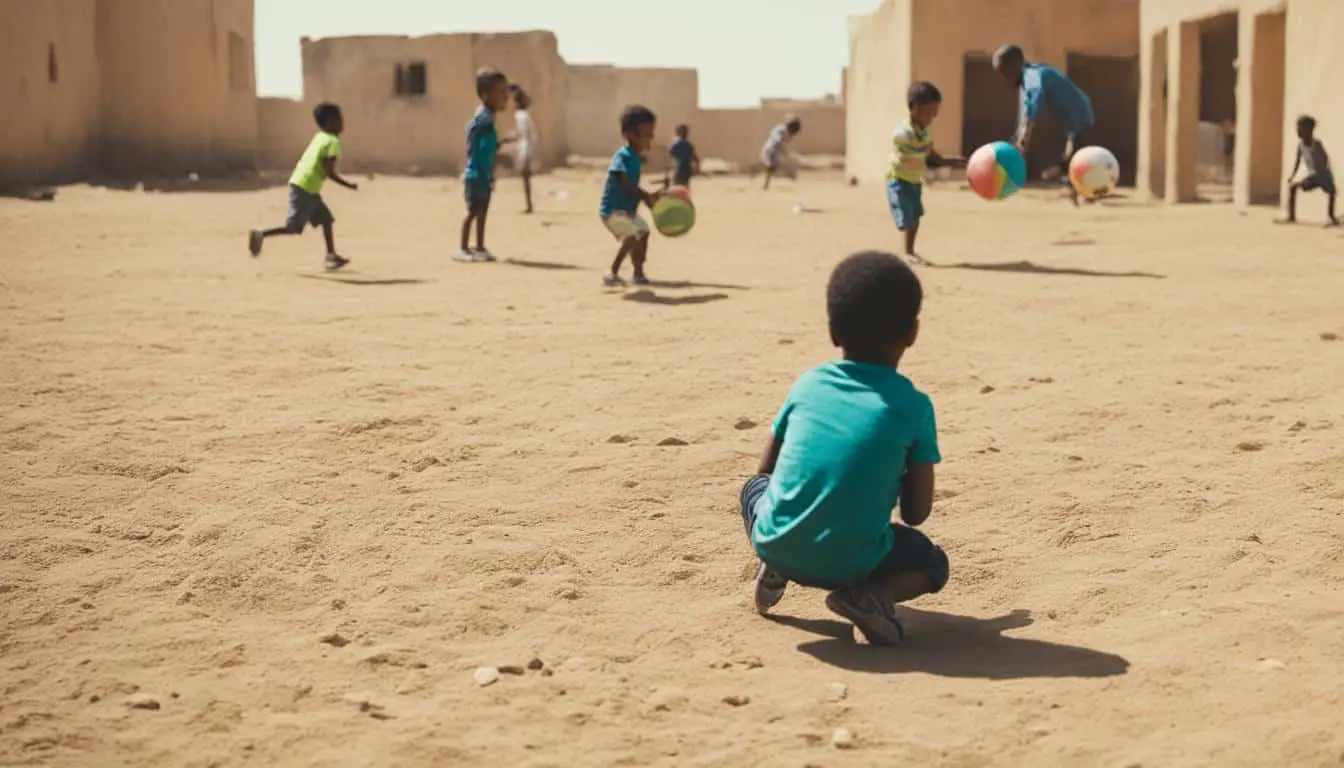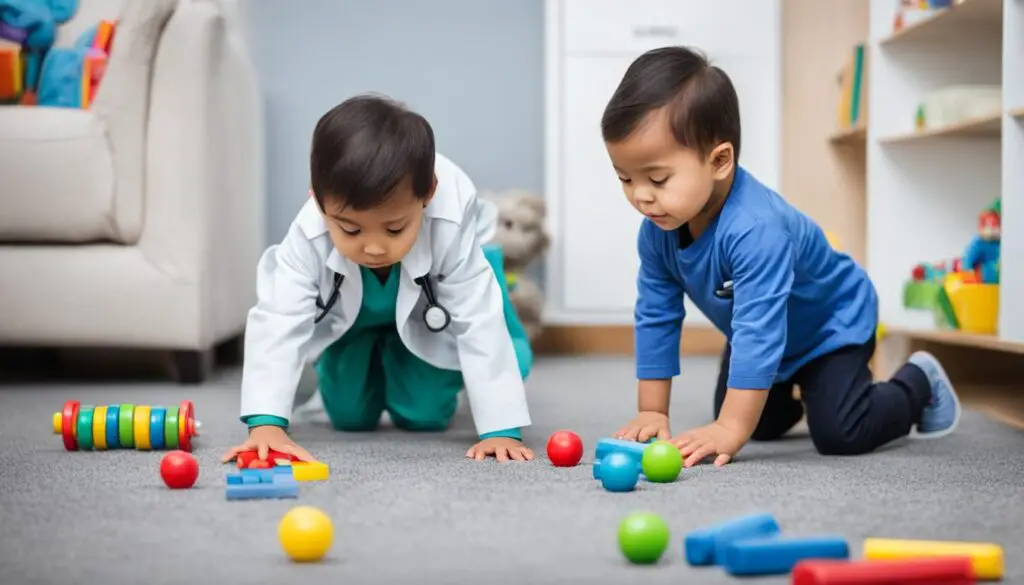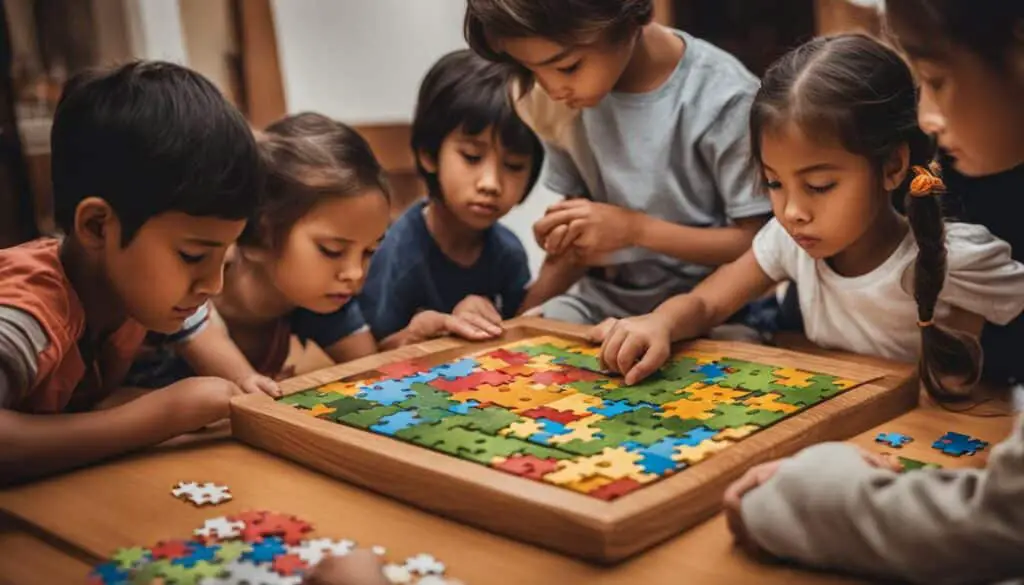
Recognizing the Signs of Developmental Delays in Children: The Importance of Early Intervention
As a professional copywriting journalist, I know how crucial it is to recognize signs of developmental delays in young children. Developmental delays are delays in children’s ability to reach typical developmental milestones, both physical and cognitive. These delays can have lasting impacts on a child’s overall growth and development, which is why it’s essential for parents and caregivers to be aware of the signs.
In this section, I will discuss some of the common signs of developmental delays in children. By recognizing these signs early on, parents and caregivers can take appropriate steps to ensure timely interventions and provide necessary support for their child’s development.
Key Takeaways
- Developmental delays can impact a child’s overall growth and development.
- Recognizing signs of developmental delays early on is crucial for early interventions.
- Parents and caregivers should be aware of some of the common signs of developmental delays in children.
- Timely interventions and support can improve outcomes for children with developmental delays.
- Early identification and intervention is key to enhancing the overall well-being of children with developmental delays.
Understanding Typical Developmental Milestones
As a parent or caregiver, it is essential to have a baseline understanding of typical developmental milestones. Developmental milestones are a series of skills and behaviors that most children achieve by a certain age. By knowing what skills are typical for certain ages, you can better track your child’s growth and recognize potential areas of concern.
The progression of skills and behaviors can vary, but there are general timelines that are followed. Here is a summary of typical developmental milestones in children:
| Age | Physical Milestones | Cognitive Milestones | Social-Emotional Milestones | Speech and Language Milestones |
|---|---|---|---|---|
| 0-3 months | -Lifts head briefly when on stomach -Follows a moving object with eyes -Startled by loud noises | -Begins to learn cause and effect -Imitates facial expressions -Smiles at familiar faces | -Prefers faces over objects -Cries to communicate hunger, discomfort, etc. | -Cooing and gurgling sounds |
| 4-6 months | -Rolls from stomach to back -Sits with support -Reaches for and grasps objects | -Recognizes familiar faces -Explores objects with mouth, hands, and eyes -Understands simple words like “no” | -Responds to familiar voices and sounds -Enjoys social play like peek-a-boo | -Babbles with consonant sounds like “baba” or “dada” |
| 7-12 months | -Crawls or scoots forward -Pulls up to stand -Uses pincer grasp to pick up small items | -Understands “bye-bye” -Imitates sounds and actions -Plays with cause and effect toys | -Develops attachment to primary caregivers -Shows anxiety when separated from caregiver -Waves bye-bye | -Says “mama” and “dada” specifically -Says one or two words with meaning |
| 13-18 months | -Walks independently -Climbs stairs with help -Throws a ball overhand | -Follows simple instructions -Points to objects in books -Listens to simple stories | -Shows empathy for others -Shares toys with others -Shows increasing independence | -Says several words with meaning -Imitates animal sounds |
| 19-24 months | -Kicks a ball -Runs without falling -Helps with simple tasks like dressing | -Shows object permanence -Sorts objects by shape and color -Listens briefly to a story | -Begins to play with peers -Shows desire for independence -Shows emotions like anger and frustration | -Says two- to three-word phrases -Asks “why” questions |
| 2-3 years | -Jumps with two feet -Climbs playground equipment -Draws a vertical line | -Says full name and age -Plays make-believe games -Matches objects by shape and color | -Plays with other children for short periods of time -Takes turns in games -Identifies own gender | -Speaks in 3-4 word sentences -Asks repetitive questions -Uses pronouns like “I” and “you” |
Remember, these milestones are general guidelines, and children may reach these skills at different times. However, these developmental milestones provide a helpful framework for monitoring your child’s growth and recognizing potential developmental delays.
Physical Developmental Delays
Physical developmental delays can have a significant impact on a child’s ability to carry out daily tasks and participate in age-appropriate activities. Here are some common signs that may indicate a physical developmental delay:
- Difficulty crawling, standing, or walking at the expected age
- Lack of coordination or balance
- Delayed muscle growth or weak muscle tone
- Difficulty with fine motor skills, such as holding a pencil or buttoning clothes
The potential causes of physical developmental delays vary and can be due to both genetic and environmental factors. Some causes of physical developmental delays include:
- Genetic disorders such as Down syndrome or cerebral palsy
- Complications at birth such as premature birth or low birth weight
- Exposure to harmful substances during pregnancy or in early childhood
- Chronic health conditions such as asthma or malnutrition
If you suspect that your child has a physical developmental delay, it’s essential to seek professional help. An early diagnosis and intervention can help your child reach their full potential and develop the necessary skills to lead a healthy life.
“Parents and caregivers play a crucial role in identifying signs of physical developmental delays and seeking appropriate interventions. Don’t hesitate to seek help when you notice any red flags.”

The Importance of Early Intervention in Developmental Delays
Recognizing and addressing developmental delays early is essential for ensuring that children receive the support they need to thrive. Early intervention can significantly improve a child’s outcomes across various developmental domains. This section explores the key aspects and benefits of early intervention for children showing signs of developmental delays.
1. Enhanced Developmental Outcomes:
Research has shown that early intervention can lead to better developmental outcomes for children with delays. Children who receive timely support are more likely to reach critical developmental milestones, including improved motor skills, communication abilities, and social interactions. This proactive approach helps set the foundation for future success in academic and social environments.
2. Tailored Support and Resources:
Early intervention programs often provide individualized support tailored to a child’s specific needs. These programs may include therapies such as speech and language therapy, occupational therapy, and behavioral therapy. By focusing on the unique challenges each child faces, these interventions can effectively address developmental delays and promote healthy growth.
3. Family Support and Education:
Early intervention is not just about the child; it also involves supporting families. Parents and caregivers receive guidance and resources that help them understand their child’s needs and how to best support their development at home. Education about developmental milestones and effective parenting strategies empowers families to play an active role in their child’s growth.
4. Building Strong Foundations:
Addressing developmental delays early on can prevent further challenges down the road. By identifying issues and providing support at a young age, children can develop essential skills that will serve them throughout their lives. This early foundation fosters confidence, independence, and resilience, allowing children to adapt to new situations and overcome obstacles.
5. Collaborative Approach:
Effective early intervention often involves a collaborative approach that includes parents, educators, healthcare providers, and therapists. This teamwork ensures that everyone is on the same page regarding the child’s development and progress. Regular communication and collaboration help create a consistent and supportive environment for the child, reinforcing the skills learned in various settings.
6. Reducing Future Costs:
Investing in early intervention can lead to significant long-term savings for families and society. By addressing developmental delays early, there is a reduced likelihood of the need for more intensive support services later in life. This proactive approach can alleviate the financial and emotional burdens associated with later interventions.
In conclusion, recognizing and addressing developmental delays through early intervention is critical for promoting healthy growth and development in children. By providing timely support, families can help their children reach their full potential and navigate the challenges of childhood with confidence and success.
Cognitive Developmental Delays
Cognitive development is a crucial aspect of a child’s growth. It encompasses their ability to understand and process information, form memories, and solve problems. Children with cognitive developmental delays may struggle with various cognitive abilities. Some common signs that a child may be experiencing cognitive developmental delays include:
- Difficulty with problem-solving and decision-making
- Slow language development
- Trouble understanding abstract concepts
- Poor focus and attention span
- Inability to retain information
It’s important to remember that every child develops at their own pace. However, if your child is significantly behind their peers, it may be a cause for concern. If you notice any of these signs or have concerns about your child’s cognitive development, seek advice from a pediatrician or specialist.
There are various interventions and support strategies available to help children with cognitive developmental delays. These can include:
- Individualized education plans (IEP) in schools
- Speech and language therapy
- Occupational therapy
- Behavioral therapy
An IEP is a legal document that outlines specific goals, accommodations, and therapies to support the individual needs of your child. Speech and language therapy can help children develop better communication skills, which can, in turn, boost cognitive abilities. Occupational therapy focuses on developing fine and gross motor skills in children, which can be beneficial for their cognitive development. Finally, behavioral therapy can help children overcome emotional and behavioral obstacles that may be impeding their cognitive growth.
It’s important to remember that early intervention is crucial for children with cognitive developmental delays. The sooner you can identify and address any concerns, the more effective support and treatment can be. By seeking help and utilizing appropriate interventions, you can help your child reach their full potential.

Social and Emotional Developmental Delays
Social and emotional skills are crucial components of a child’s overall growth and development. Children with social and emotional developmental delays may face challenges in various areas, including interacting with others, empathizing with others’ emotions, and regulating their own emotions and behavior.
Identifying signs of social and emotional developmental delays early on is essential for providing timely support and intervention. Some common symptoms include difficulty maintaining eye contact, trouble interpreting nonverbal cues, difficulty making friends, and outbursts of intense emotions.
Early intervention is key for improving outcomes and helping children reach their full potential. For instance, early childhood programs and play therapy can help children develop effective social skills, while cognitive-behavioral therapy and mindfulness practices can teach children how to regulate their emotions and behavior.
It’s also important for parents and caregivers to create a supportive and nurturing environment at home that helps children build strong social and emotional skills. This can be achieved by modeling positive behavior, encouraging open communication, and providing opportunities for children to practice social skills through play and other everyday activities.
Parents and caregivers should seek professional help if they notice any significant delays or difficulties in their child’s social or emotional development. Early intervention is critical for helping children with social and emotional developmental delays reach their full potential and lead happy, healthy lives.
Speech and Language Developmental Delays
When it comes to speech and language developmental delays, there are several signs that parents and caregivers should be aware of. Some common indicators may include:
- Delayed language and speech development
- Difficulty understanding instructions or questions
- Limited vocabulary or use of simple sentences
- Difficulty with articulation and enunciation of words
- Difficulty with grammar or word order
If these signs persist, it may be beneficial to consult a speech therapist or language pathologist for further evaluation and tailored intervention.
Early intervention is crucial for children with speech and language developmental delays. A speech therapist or language pathologist can provide specialized support and tools to help children improve their communication skills and effectively express themselves.
In addition, parents and caregivers can also promote and support speech and language development in their children by engaging in activities that foster language acquisition and communication, such as reading books together, singing songs, and incorporating new vocabulary words into daily conversations.
“Communication is the essence of human life.”
Red Flags and When to Seek Help
As a parent or caregiver, it’s essential to be aware of any signs that may indicate a developmental delay. These “red flags” will vary depending on the child’s age and developmental stage.
The following are some examples of red flags:
| Developmental Area | Red Flags |
|---|---|
| Physical Development | Difficulty with coordination, weakness, excessive clumsiness |
| Cognitive Development | Difficulty with problem-solving, difficulty understanding & expressing language, poor memory skills |
| Social and Emotional Development | Difficulty with understanding social cues, lack of interest in interacting with others, excessive tantrums or emotional outbursts |
| Speech and Language Development | Difficulty with articulation, difficulty understanding & expressing language, limited vocabulary |
If any of these red flags are observed, seeking professional help from a pediatrician, a specialist in child development, or an early intervention program is important. Early identification and intervention can help a child reach their full potential.
It’s important to note that red flags alone do not necessarily mean that a child has a developmental delay. However, it’s better to err on the side of caution and seek professional help if you have concerns.
Remember, as a parent or caregiver, you know your child best. Trust your instincts and seek help if something feels off.
Conclusion
In conclusion, recognizing signs of developmental delays in children is crucial for their overall growth and well-being. By understanding typical developmental milestones, we can identify potential areas of concern and seek appropriate help and interventions.
Physical, cognitive, social and emotional, and speech and language developmental delays can all impact a child’s ability to thrive. Identifying red flags and seeking professional help when necessary can make a significant difference in a child’s progress.
As a professional copywriting journalist, I urge parents and caregivers to be proactive in monitoring their children’s development and to seek help when concerns arise. With early intervention and support, children with developmental delays can achieve their full potential and lead happy, fulfilling lives.
FAQ
What are the signs of developmental delays in children?
Some common signs of developmental delays in children include delayed motor skills, speech and language delays, difficulties with problem-solving and learning, challenges with social interactions and emotional regulation, and delays in reaching typical developmental milestones. It’s important to note that every child develops at their own pace, but significant delays or regression in these areas should be addressed.
‘H3Q: How do I recognize typical developmental milestones in children?
Typical developmental milestones in children can vary based on their age, but some general indicators include rolling over, sitting up, crawling, walking, using simple words, and following basic instructions. There are developmental milestone checklists available for different age groups that can help parents and caregivers track their child’s progress. It’s important to consult with pediatricians and early childhood professionals for a comprehensive understanding of typical developmental milestones.
What are physical developmental delays?
Physical developmental delays refer to delays in motor skills, coordination, and muscle growth. Signs of physical developmental delays can include delayed crawling, walking, difficulty with fine motor tasks such as holding utensils or writing, and challenges with balance and coordination. These delays can be caused by various factors, including genetic conditions, prematurity, or environmental factors. Early intervention is crucial in addressing physical developmental delays.
What are cognitive developmental delays?
Cognitive developmental delays are delays in a child’s ability to think, reason, and learn. Signs of cognitive developmental delays can include difficulties with problem-solving, limited vocabulary, delays in understanding and expressing language, and challenges with attention span and memory. These delays can be caused by various factors, such as genetic conditions, neurodevelopmental disorders, or environmental factors. Early identification and intervention can support cognitive development.
How do I recognize social and emotional developmental delays?
Social and emotional developmental delays manifest as challenges in social interactions, empathy, and self-regulation. Signs can include difficulties making and maintaining friendships, limited emotional expression, and struggles with regulating emotions. These delays can be caused by various factors, such as autism spectrum disorders, trauma, or environmental factors. Early intervention, including social skills training and therapy, can help address social and emotional developmental delays.
What are the signs of speech and language developmental delays?
Speech and language developmental delays can present as limited vocabulary, difficulties with articulation or pronunciation, delays in understanding and following instructions, and challenges with expressive language. These delays can be caused by factors such as hearing impairments, language disorders, or developmental disorders. Early intervention, such as speech therapy, is crucial in addressing speech and language developmental delays.
What are the red flags for developmental delays and when should I seek help?
Some red flags for developmental delays include a significant delay in reaching developmental milestones, regression in previously acquired skills, persistent difficulties with communication, social interactions, and problem-solving, and challenges with self-help skills. If you observe these red flags or have concerns about your child’s development, it is important to consult with your pediatrician or seek a referral to a developmental specialist for further evaluation and assistance. Early intervention is key in supporting children with developmental delays.
Why is it important to recognize signs of developmental delays in children?
Recognizing signs of developmental delays in children is crucial for early intervention and support. Timely identification and appropriate interventions can help address delays, promote healthy development, and potentially prevent further challenges or difficulties later in life. By recognizing these signs, parents, caregivers, and professionals can ensure that children with developmental delays receive the necessary support and resources to thrive.